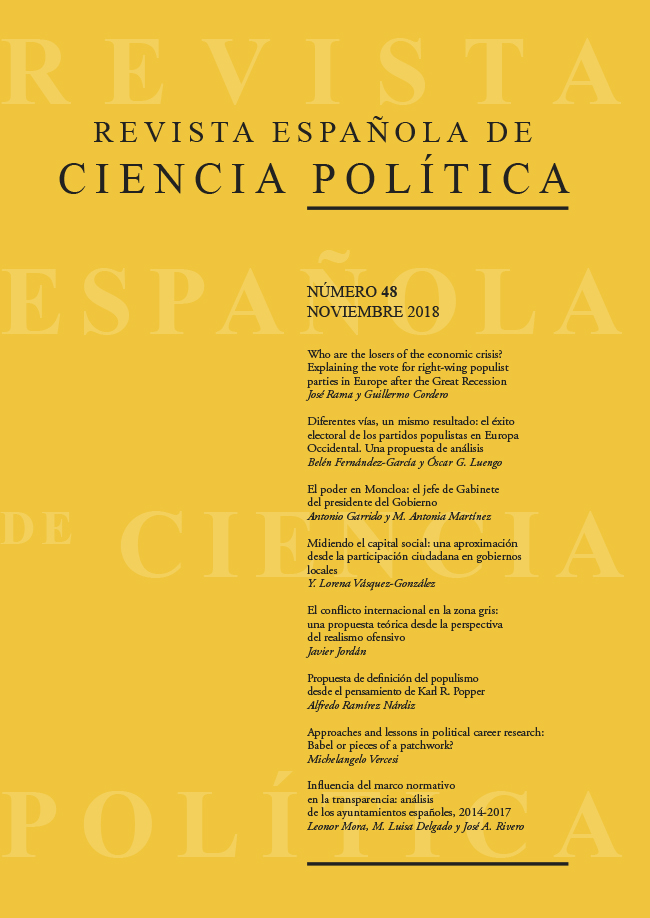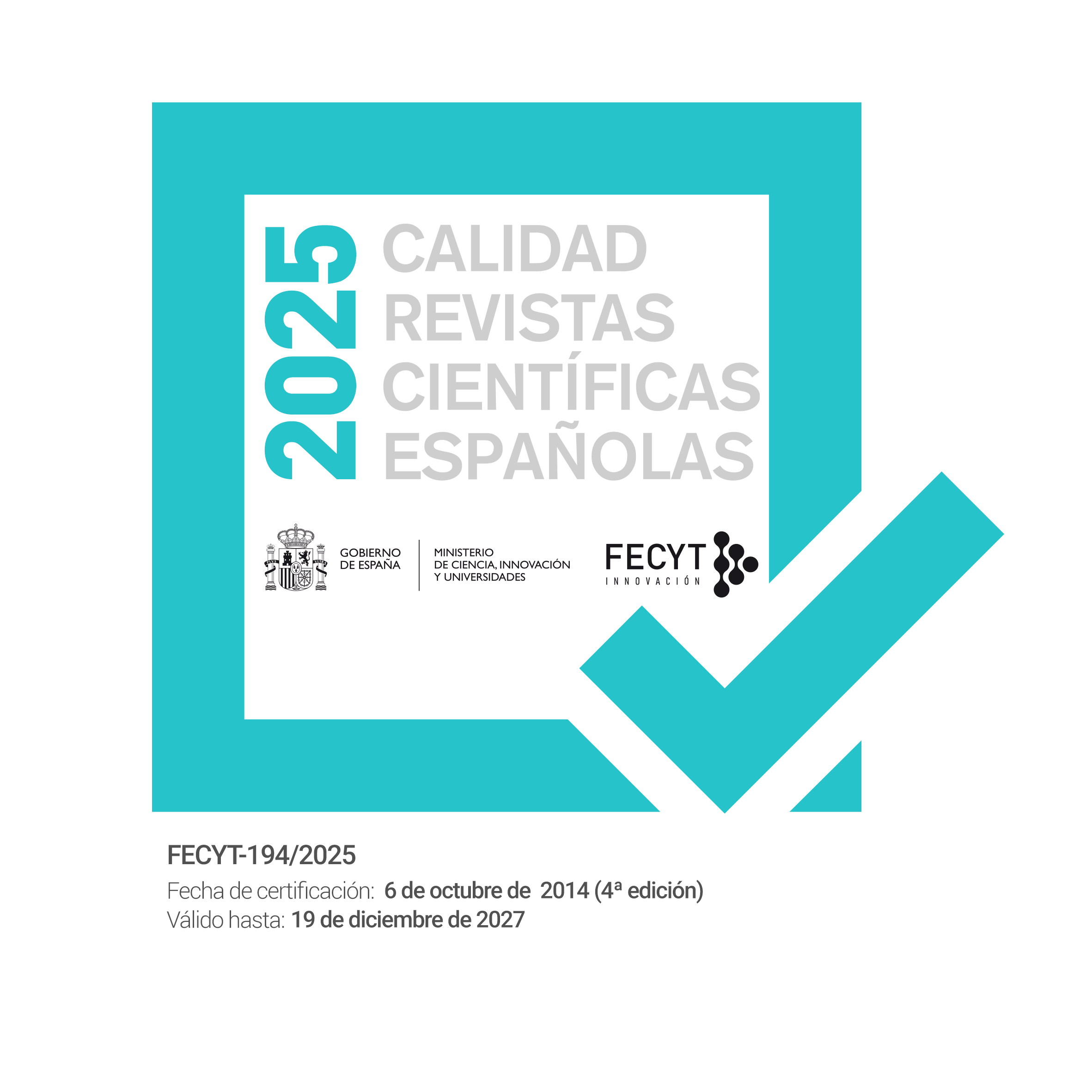Different paths, same outcome: The electoral success of populist parties in Western Europe. An analysis proposal
DOI:
https://doi.org/10.21308/recp.48.02Keywords:
populism, anti-establishment, political parties, comparative process tracing, QCA.Abstract
The aim of this article is to analyse the electoral settings favorable to the populist parties in Western Europe after the economic crisis. To this end, a comparative process tracing has been applied to a selection of cases (Spain 2011-15, United Kingdom 2010-15 and Sweden 2010-14) after a fuzzy Qualitative Comparative Analysis (fsQCA) to 26 general elections held in Western Europe between 2010 and 2015. The results suggest that the electoral success achieved by these parties cannot be explained by a single causal condition, but different paths can lead to the same phenomenon: on the one hand, a very favorable demand (high levels of dissatisfaction and political mistrust) can be sufficient to explain the electoral success of these parties, even when competing within an unfavorable political and institutional context; on the other hand, certain party competition patterns (coalitions and convergence in proportional electoral systems) can be sufficient, even if demand is unfavorable. Finally, this analytical proposal can be extended to the study of other types of political organisations, such as the so-called anti-immigrant parties.Downloads
References
Akkerman, Tjitske y Matthijs Rooduijn. 2015. «Pariahs or Partners? Inclusion and Exclusion of Radical Right Parties and the Effects on Their Policy Positions», Political Studies, 63 (5): 1140-1157. Disponible en: https://doi.org/10.1111/1467-9248.12146.
Bril-Mascarenhas, Tomás, Antoine Maillet y Pierre-Louis Mayaux. 2017. «Process tracing: inducción, deducción e inferencia causa», Revista Ciencia Política, 37 (3): 659-684. Disponible en: https://doi.org/10.4067/S0718-090X2017000300659.
Canovan, Margaret. 2002. «Taking Politics to the People: Populism as the Ideology of Democracy», en Yves Mény y Yves Surel (eds.), Democracies and the populist challenge. Nueva York: Palgrave. Disponible en: https://doi.org/10.1057/978140 3920072_2.
Delgado-Fernández, Santiago y Ángel Cazorla-Martín. 2017. «El Partido Socialista Obrero Español: de la hegemonía a la decadencia», Revista Española de Ciencia Política, 44: 247-273. Disponible en: https://doi.org/10.21308/recp.44.10.
Della Porta, Donatella, Joseba Fernández, Hara Kouki, Lorenzo Mosca. 2017. Movement Parties Against Austerity. Cambridge: Polity Press.
Duverger, Maurice. 2014. «Influencia de los sistemas electorales en la vida política», en A. Batlle i Rubio (eds.), Diez textos básicos de ciencia política. Barcelona: Ariel.
Fernández-García, Belén y Óscar G. Luengo. 2018. «Populist parties in Western Europe. An analysis of the three core elements of populism», Communication and Society, 31(3): 57-74.
Gallagher, Michael. 2015. Election indices dataset. Disponible en: https://bit.ly/2qkvtz5 [consulta: 28 de septiembre de 2017].
Goodwin, Matthew. 2015. «The Great Recession and the rise of populist Euroscepticism in the United Kingdom», en Hanspeter Kriesi y Takkis Pappas (eds.), European Populism in the Shadow of the Great Recession. Colchester: ECPR Press.
Hakhverdian, Armèn y Christel Koop. 2007. «Consensus democracy and support for populist parties in Western Europe», Acta Política, 42: 401-420. Disponible en: https://doi.org/10.1057/palgrave.ap.5500202.
Hanley, Sean y Allan Sikk. 2016. «Economy, corruption or floating voters? Explaining the breakthroughs of anti-establishment reform parties in Eastern Europe», Party Politics, 22 (4): 522-533. Disponible en: https://doi.org/10.1177/13540 68814550438.
Hooghe, Liesbet y Gary Marks. 2018. «Cleavage theory meets Europe’s crises: Lipset, Rokkan, and the transnational cleavage», Journal of European Public Policy, 25 (1): 109-135. Disponible en: https://doi.org/10.1080/13501763.2017.1310279.
Jungar, Ann-Cathrine. 2015. «Business as usual: Ideology and populist appeals of the Sweden Democrats», en Hanspeter Kriesi y Takkis Pappas (eds.), European Populism in the Shadow of the Great Recession. Colchester: ECPR Press.
Katz, Richard y Peter Mair. 2009. «The Cartel Party Thesis: A Restatement», Perspectives on Politics, 7 (4): 753-766.
Kitschelt, Herber y Anthony McGann. 1995. The radical right in Western Europe. Ann Arbor: University of Michigan Press.
Kriesi, Hanspeter, Edgar Grande, Romain Lachat, Martin Dolezal, Simon Bornschier y Timotheos Frey. 2006. «Globalization and the transformation of The National political space: six European countries compared», European Journal of Political Research, 45 (6): 921-56. Disponible en: https://doi.org/10.1111/j.1475-6765.2006.00644.x.
Kriesi, Hanspeter y Takis Pappas. 2015. European populism in the shadow of the great recession. Colchester: ECPR Press.
Luengo, G. Óscar y Belén Fernández-García. 2019. «Campaign coverage in Spain: Populism, emerging parties and personalisation», en Susana Delgado (eds.), Mediated Campaigns and Populism in Europe. Londres: Palgrave Macmillan.
March, Luke. 2017. «Left and right populism compared: The British case», The British Journal of Politics and International Relations, 19 (2): 282-303. Disponible en: https://doi.org/10.1177/1369148117701753.
Medina, Iván, Priscilla Álamos-Concha, Pablo José Castillo Ortiz y Benoit Rihoux. 2017. Análisis Cualitativo Comparado (QCA). Madrid: Centro de Investigaciones Sociológicas.
Mudde, Cas. 2004. «The Populist Zeitgeist», Government and Opposition, 39 (4): 542-563. Disponible en: https://doi.org/10.1111/j.1477-7053.2004.00135.x.
Mudde, Cas. 2007. Populist Radical Right Parties in Europe. Nueva York: Cambridge University Press. Disponible en: https://doi.org/10.1017/CBO9780511492037.
Mudde, Cas y Cristóbal Rovira. 2013. «Exclusionary vs. inclusionary populism: Comparing contemporary Europe and Latin America», Government and Opposition, 48 (2): 147-174. Disponible en: https://doi.org/10.1017/gov.2012.11.
Mudde, Cas y Cristóbal Rovira. 2017. Populism. A Very Short Introduction. Oxford; Nueva York: Oxford University Press.
Murphy, Justin y Daniel Devine. 2018. «Does Public Support for UKIP Drive Their Media Coverage or Does Media Coverage Drive Support for UKIP?», British Journal of Political Science (en prensa). Disponible en: https://doi.org/10.1017/S0007123418000145.
Norris, Pippa. 2005. Radical right: voters and parties in the electoral market. Cambridge: Cambridge University Press. Disponible en: https://doi.org/10.1017/CBO9780511615955.
Papadopoulos, Yannis. 2005. «Populism as the other side of consociational multi-level democracies», en Daniele Caramani y Yves Mény (eds.), Challenges to Consensual Politics: Democracy, Identity, and Populist Protest in the Alpine Region. Bruselas: P.I.E., Peter Lang.
Polk, Jonathan, Jan Rovny, Ryan Bakker, Erica Edwards, Liesbet Hooghe, Seth Jolly, Jelle Koedam, Filip Kostelka, Gary Marks, Gijs Schumacher, Marco Steenbergen, Milada Vachudova y Marko Zilovic. 2015. 2014 Chapel Hill Expert Survey. Version 2015.1. Chapel Hill, NC: University of North Carolina, Chapel Hill. Disponible en: www.chesdata.eu.
Riera, Pedro y José R. Montero. 2017. «Attemps to Reform the Electoral System in Spain: The Role of Experts», Election Law Journal: Rules, Politics, and Policy, 16 (3): 367-376. Disponible en: https://doi.org/10.1089/elj.2017.0439.
Rydgren, Jens 2008. «Sweden: The Scandinavian Exception», en Danielle Albertazzi y Duncan McDonnell (eds.), Twenty-First Century Populism: the Spectre of Western European Democracy. Basingstoke: Palgrave Macmillan. Disponible en: https://doi.org/10.1057/9780230592100_9.
Rydgren, Jens y Sara Van der Meiden. 2018. «The radical right and the end of Swedish exceptionalism», European Political Science, 1-17. Disponible en: https://doi.org/10.1057/s41304-018-0159-6.
Schedler, Andreas. 1996. «Anti-political-establishment parties», Party Politics, 2 (3): 291-312. Disponible en: https://doi.org/10.1177/1354068896002003001.
Schneider, Carsten e Ingo Rohlfing. 2013. «Combining QCA and Process Tracing in Set-Theoretic Multi-Method Research», Sociological Methods and Research, 42 (4): 559-597. Disponible en: https://doi.org/10.1177/0049124113481341.
Taggart, Paul. 2002. «Populism and the Pathology of Representative Politics», en Yves Mény y Yves Surel (eds.), Democracies and the populist challenge. Nueva York: Palgrave. Disponible en: https://doi.org/10.1057/9781403920072_4.
Van Kessel, Stijn. 2015. Populist Parties in Europe. Agents of Discontent? Londres: Palgrave. Disponible en: https://doi.org/10.1057/9781137414113.
Downloads
- PDF (Español (España))
- HTML (Español (España))
- XML (Español (España))
- Gráfico 1 (Español (España))
- Gráfico 2 (Español (España))
- Gráfico 3 (Español (España))
- Gráfico 4 (Español (España))
- Gráfico 5 (Español (España))
- Gráfico 6 (Español (España))
- Gráfico 7 (Español (España))
- Gráfico 8 (Español (España))
- Tabla 1 (Español (España))
- Tabla 2 (Español (España))
Additional Files
Published
How to Cite
Issue
Section
License
Copyright (c) 2018 Belén Fernández García; Óscar G. Luenbo

This work is licensed under a Creative Commons Attribution-NonCommercial-NoDerivatives 4.0 International License.






